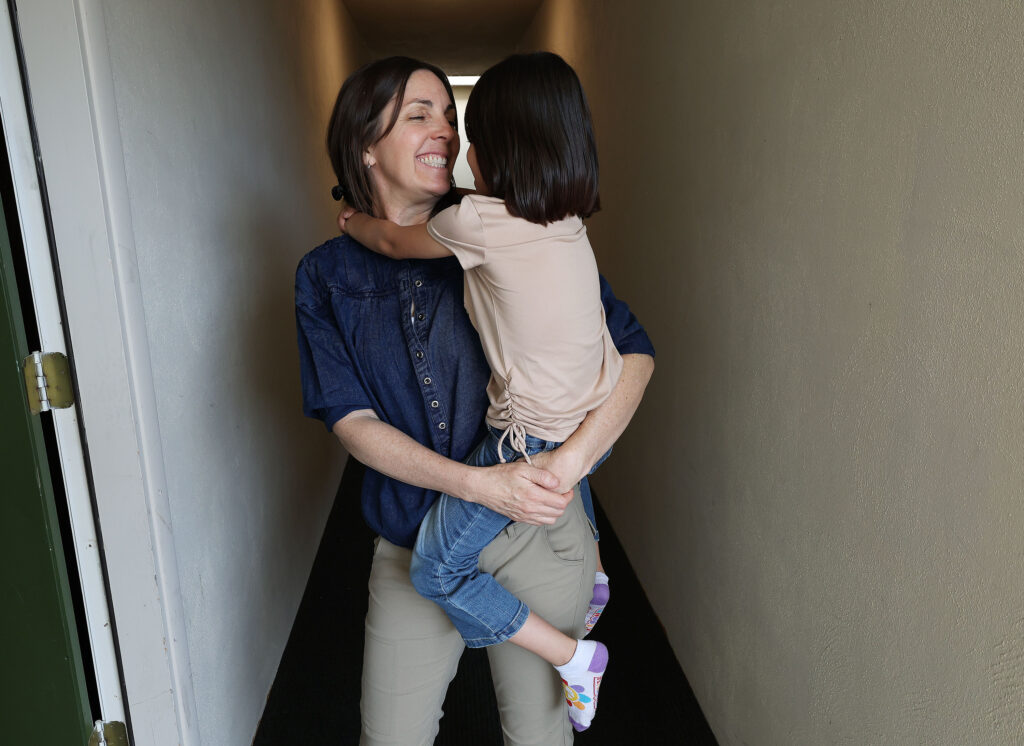
16-year-old Baran and her older sister woke up in their new home in Salt Lake City thinking they needed to find help. It was winter, their power was out, the heat wasn’t working, their 4-year-old niece didn’t have warm clothes, and they had no phone – no way to reach anyone.
That morning, they ventured out onto the snowy walkway connecting the apartments to try talking to neighbors in the complex.
“When we go outside, we see that there is an Afghan family and they say to each other ‘goodbye’ in our language,” Baran said. Luckily, she was able to communicate with her neighbors. The neighbors contacted a leader in the community who had been helping the new arrivals – Nazifa, a refugee who fled Afghanistan in the late nineties after her father was killed by the Taliban. She did not want her last name used because she still has family in Afghanistan who could be at risk.
“I know how hard it is to settle here,” Nazifa said. “I have family in Afghanistan that are stuck there, and I know how they feel about it. So we’re just here to make life easier for them, at least for the next two or three months.”
The next day, Nazifa came to visit Baran and her family, took them grocery shopping and helped them figure out how to get the power turned on in their apartment. But as Nazifa started tracking down the new arrivals in hotel rooms and apartments, she realized it was more than she could do on her own. Through word of mouth and organizing events, she and others started building up a network of volunteers to spread out the work. It was through this network that a neighbor named Kerry Wickman met Baran and her family.
“I met them, fell in love with them instantly,” Wickman said.
Wickman, who is a social worker and a Relief Society president in her Latter-day Saint ward, decided to do what overtaxed agencies couldn’t do. She took Baran to get enrolled in the local public high school, helped the older sister get a job at a daycare center, drove them to appointments, and collected money for things they need in the U.S. and to send home for their family back in Afghanistan.
“They’re like family, so I just do the things I would do for my family,” Wickman said. “They fill my heart every day I’m with them. I come home and my husband says, ‘You’re glowing.'”
“If Kerry was not here, we couldn’t do anything,” Baran said. “She’s our mom, both my mom and my best friend.”
It was not clear what Wickman could do, though, about the fact that their 4-year-old niece was here without her parents. When an airplane flew over their apartment in Salt Lake City, the young girl mistakenly believed her parents were finally coming for her.
“My mom and my dad are coming home,” she told her aunts. “Let’s go to the airport.”
“I think that she — not understanding what happened — believes that they abandoned her,” Wickman said. “I don’t know how you rectify this damage until this family is reunited again.”
Meanwhile, their family back in Afghanistan fled their home and went into hiding because they were afraid of what would happen if the Taliban found them. Baran and her sister worried about their father who had trouble breathing after contracting COVID-19, and needed oxygen. Wickman collected money from her contacts to send back to Afghanistan, but Baran said her father wouldn’t use all the money on himself.
“My father is actually so kind,” Baran said. “In Afghanistan, he said you have to help your neighbors, everybody that you meet, you have to help them.” Baran believes that it is because of her father’s lifetime of generous deeds that Wickman has come into their lives, their honorary mom. “I think God sent Kerry for us,” Baran said, “Every time that we need something, or we are faced with a problem, she comes and helps us.”
What would their lives be like if they never met Kerry Wickman? It’s impossible to know, but there are thousands like Baran, her sister and niece all over the country – maybe in your neighborhood. Their stories are hidden among us. What is our moral obligation to our new neighbors? What kind of a community do we want to be? These are the questions we grapple with on Stranger Becomes Neighbor, as we uncover the stories of our newest neighbors and the ways we are connected.